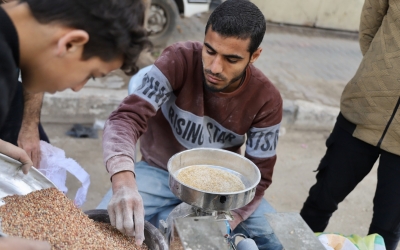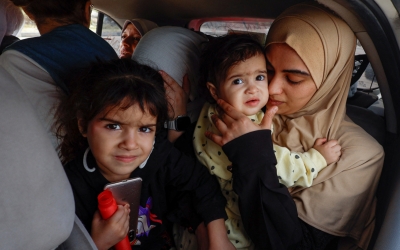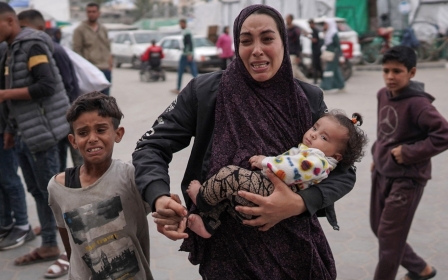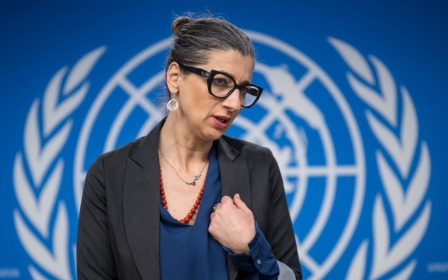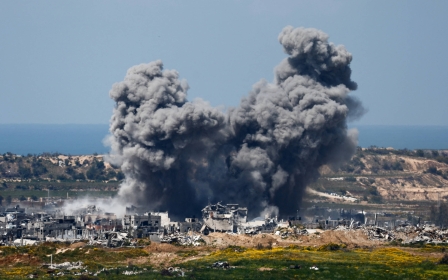War on Gaza: For many Palestinians in Gaza, there is little appetite for Eid
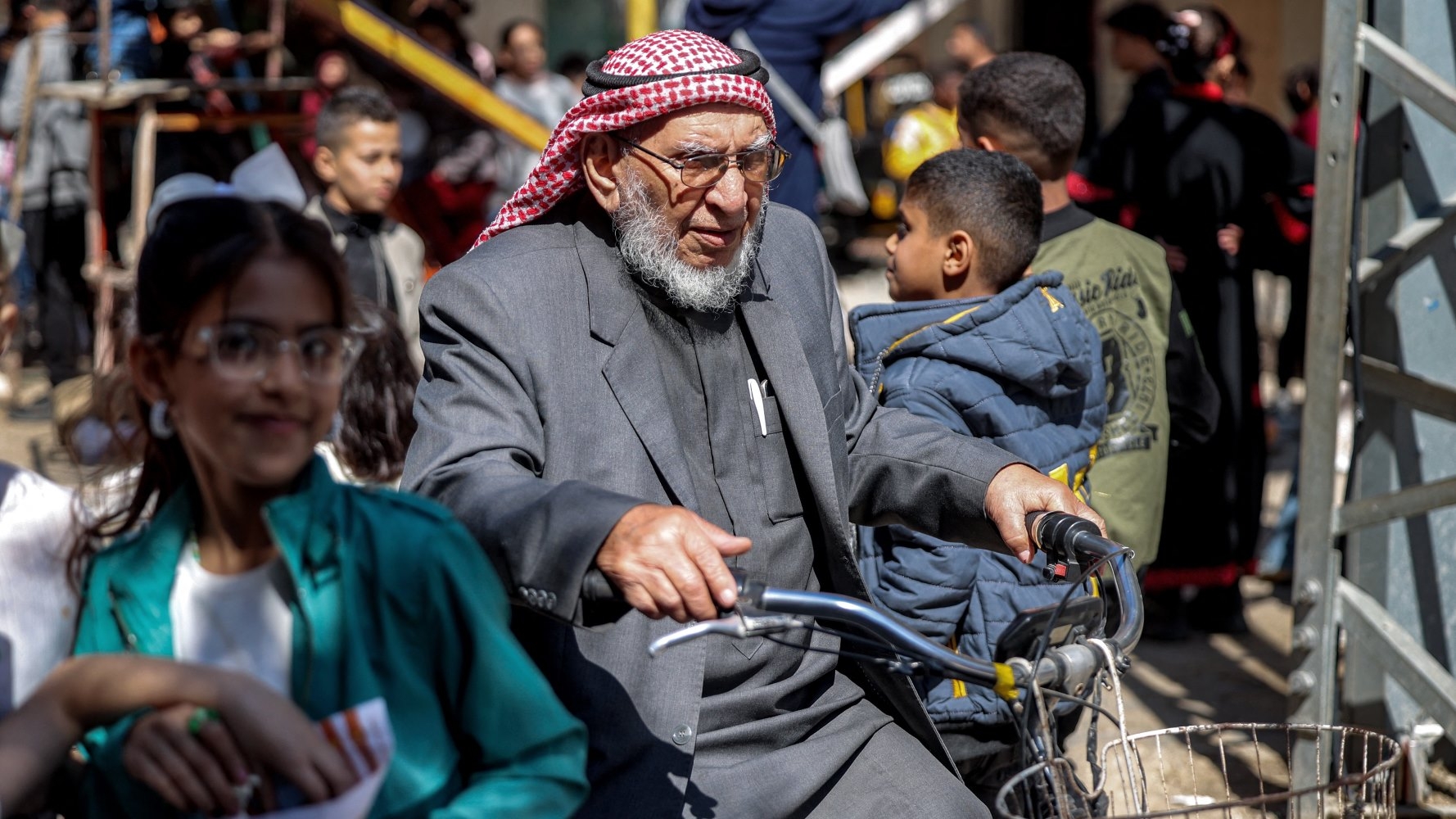
After six months of war, more than 33,000 Palestinian deaths and the vast majority of the besieged territory left in ruins, the people of Gaza are struggling to find any joy on Eid al-Fitr.
Israel’s military campaign continued throughout the Muslim holy month of Ramadan, with thousands killed in air strikes and shootings.
Israel has also restricted the flow of aid into the Palestinian territory, leaving most of its residents grateful to get basic food staples, let alone have enough to celebrate in the feasts usually associated with Eid.
“Eid is the joy of children in new clothes and playing with toys, and for adults it is about receiving visitors and family members,” says 53-year-old Rawan al-Zard, recalling past celebrations.
“This year, children were deprived of joy because of their fears over the bombings,” she adds.
New MEE newsletter: Jerusalem Dispatch
Sign up to get the latest insights and analysis on Israel-Palestine, alongside Turkey Unpacked and other MEE newsletters
For Zard, past Eids were spent visiting family members, catching up on gossip and eating freely after a month of fasting.
Now there are more pressing concerns on people’s minds, namely staying alive amid the constant threat from Israeli forces, and the sombre reality that almost everyone in Gaza is in mourning.
'In every home, there is a martyr or someone wounded'
- Rawan al-Zard, Gaza resident
“In every home, there is a martyr or someone wounded,” she says.
Like most in Gaza, Zard never imagined the war would last this long, and the stress of trying to survive has made celebrating religious festivals the least of her concerns.
Even if she were inclined to celebrate, she does not know how to. Her house is partially destroyed and she is having to stay with relatives as a result.
While Zard puts on a brave front for her children, she knows there are no recreational spaces where she can take them to play.
No relatives or friends plan to visit for Eid; but if they did, she wonders where she would host them, without a house.
When Eid passes, war remains, and Zard says joy will only return for her and other Palestinians in Gaza when they can return to their homes and the war ends.
‘Years to recover’
Zard is one of many who cannot bring themselves to celebrate Eid al-Fitr, one of Islam’s two major religious holidays.
Rula Ajour, a mother of five, used to spend the last fortnight of Ramadan preparing for the day of Eid.
She would decorate her house, buy clothes for the children, and prepare traditional Palestinian sweets.
This year, the occasion is just a reminder of what has been lost – namely, 25 members of her extended family.
“My family and I would always anticipate the Eid holiday and our house had an atmosphere of happiness,” Ajour recalls.
Today she is stuck in northern Gaza, amid the debris of Israel’s campaign of destruction, while her relatives are divided between those who have died and those who are seeking refuge in the south.
“The war destroyed everything,” she says. “I don’t feel happy or safe. I spoke to my sister to send her Eid greetings and told her that by the next Eid we will be fine, but I couldn’t talk and we started crying.”
An understanding that Eid cannot be celebrated this year extends to children as well.
Ajour says that her seven-year-old son, Yassin, told her that he could not be happy for the occasion, given how many people had died. She describes buying Eid clothes for him and the others using money that she had borrowed, but they refused to wear them.
“We never expected that we would live with all this pain, loss and hunger,” she adds. “They refuse to let us live in peace. Even if the war ends now, we will need years to recover from the traumas that we have experienced.”
‘A steadfast people’
For Muslims, the day of Eid al-Fitr represents a return to some sense of normal routine after a month of forgoing food and water during daylight hours.
But for Palestinians in Gaza, the new normal is far more arduous than a day spent fasting. Little remains of the world they inhabited just over six months ago.
Iyad Islim, 66, describes Eid as little more than a “consolation” after months of suffering.
The Israeli army destroyed the houses of three of his daughters, who now live together in a small, cramped house.
There are 22 people in total, and Islim struggles to look after his family on his meagre salary.
“I am unable to provide the basic needs of food and clothes for my family,” he tells Middle East Eye.
“The Israeli occupation army’s planes are still flying at a low altitude, as if they are telling us that they will continue to kill us even on our holy days.”
One particular source of grievance for Islim is the destruction of all the markers of “normal” life in Gaza, including markets and places of worship.
“They even destroyed the mosques in which we used to perform the Eid prayers,” he says. “The occupation is trying to erase our social, cultural and religious memory, but they are powerless, because we are steadfast people.”
For many, though, steadfastness is turning to a despair that has no resolution in sight.
MEE asked Husni al-Maidana, 67, what Eid meant to him.
“Eid for me is family,” he said, before collapsing in tears and excusing himself from the conversation.
His wife explained that they were going to see their daughter, her husband and son-in-law, who live in a camp for displaced people with thousands of others. Her daughter's house was destroyed by an Israeli missile, and her husband’s family remain buried under its rubble.
Middle East Eye delivers independent and unrivalled coverage and analysis of the Middle East, North Africa and beyond. To learn more about republishing this content and the associated fees, please fill out this form. More about MEE can be found here.


